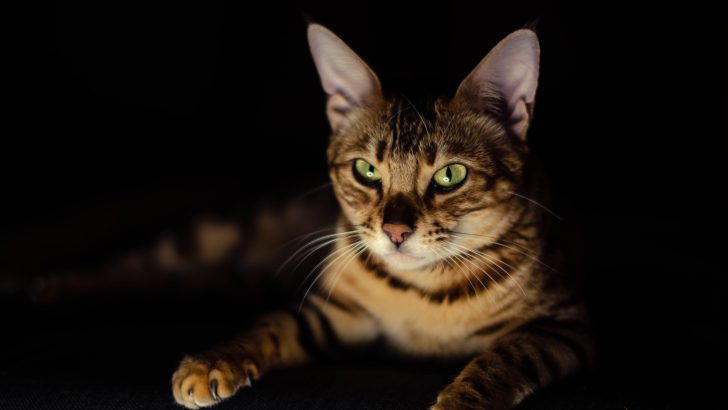“Are Bengal cats aggressive?” you ask, and we deliver. Bengal cats are many things – they’re strikingly beautiful, affectionate, and charming. They appreciate hanging out with humans, running around the backyard, and knocking things down for no apparent reason.
They have addicting purrsonalities and make for great gym partners because they’re physically active. But, they’re not aggressive. As a matter of fact, they’re not more aggressive than any other breed that loves to play pranks on humans and cause trouble as a form of entertainment.
And, while they do have those moments when they’re play-fighting, they’re not an aggressive breed.
Of course, none of the breeds are necessarily aggressive – problems with behavior appear due to a bunch of factors. But, genetic markers aren’t typically the ones that stand out.
More often than not, our four-legged friends act out because they’re stressed out or overwhelmed. Perhaps they haven’t even been taught how to behave when dealing with different situations.
For example, your Bengal might start hissing and growling when your friends come over because she hasn’t been properly socialized growing up. She’s not acting up because she’s a Bengal – she’s acting up because she’s uncomfortable and doesn’t know better.
Sure, haters and naysayers might argue how “multicolored cats are more aggressive than monotone-colored ones” because they read one article on the topic. But, pretty much everyone’s experience with Bengal cats suggests that they are the sweethearts of the feline world (with a bad reputation).
Alas, worry not about your future Bengal kittens. We’re bringing you a rundown on everything you need to know about the behavior of these Liliputian leopards and we’re starting with a bang.
Why do Bengal cats have a reputation for being aggressive?
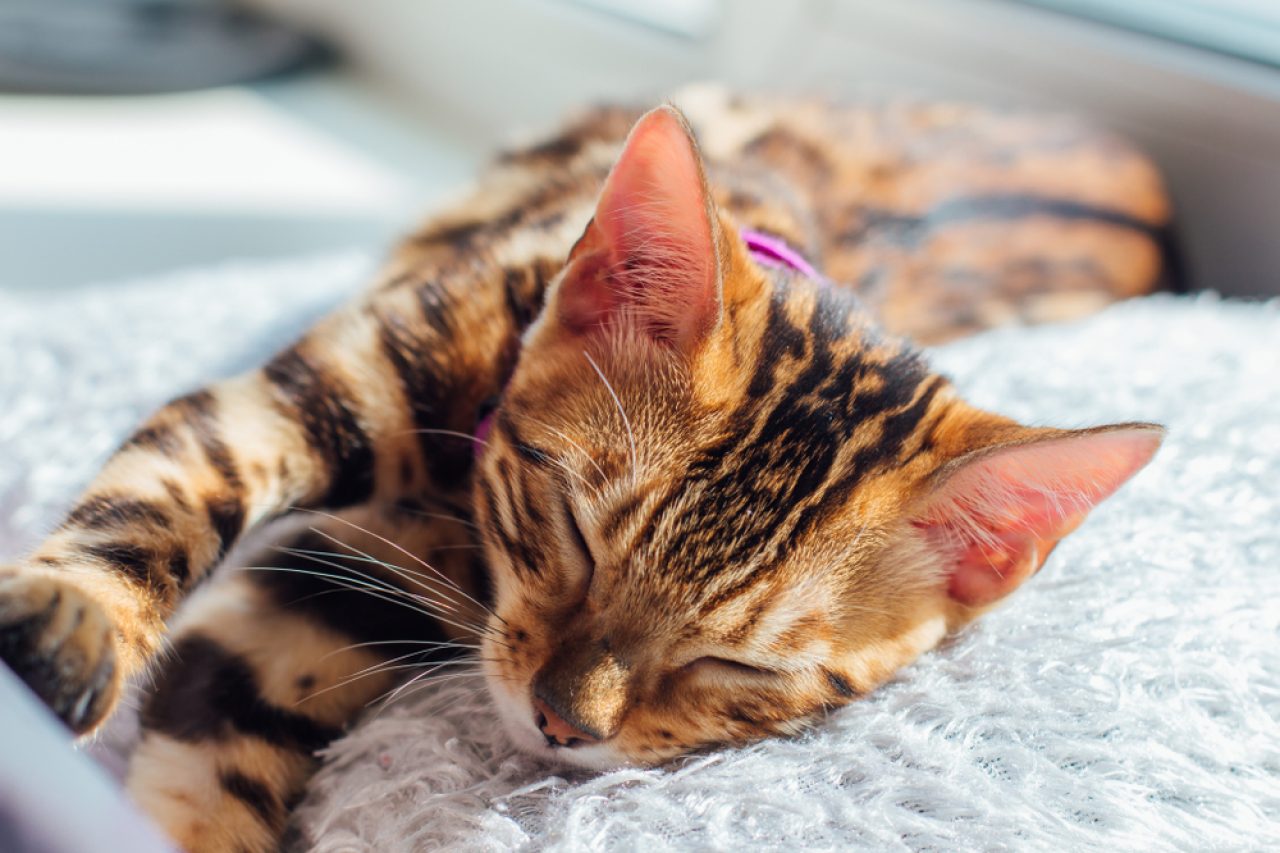
Oh, you wouldn’t believe the tales that have been circling for years! Turns out that when you’re physically active, attitude-ridden, and a little mean, everyone paints you to be the villain of the feline world! And, trust me, Bengal cats don’t deserve the negative “word on the street” stories they get.
Sure, Bengals look like the embodiment of wilderness when they’re roaming around your backyard. And they have those rosette markings to thank for that. The fact that they came to be as a cross between an Asian leopard cat and a domestic cat doesn’t help the case.
However, they’re far from wild considering how affectionate, appreciative, and absolutely loyal they are. Truth be told, they abandoned their wild natures a long time ago.
Bengal cats appeared as early as the 1800s but didn’t get accepted as a breed until the mid-20th century. And, we can’t forget about the fact that Bengal cats go through a meticulous process of classification.
Actually, they’re classified by how many generations have passed from the original (wild) parent. An Asian leopard kitten would be an F1. But, an accepted Bengal kitten would have to be at least an F4. On the other hand, an F6 would be considered the perfect level of domesticated.
Why are we focusing on the origins of Bengal cats as much as we are, you might ask? Because one of the most prominent reasons why pet parents consider Bengals aggressive seems to be the fact that they’re (in a way) connected to wild cats. And, we don’t think of wild cats as proper, non-aggressive pets.
What’s the truth behind those rumors: Are Bengal cats aggressive?
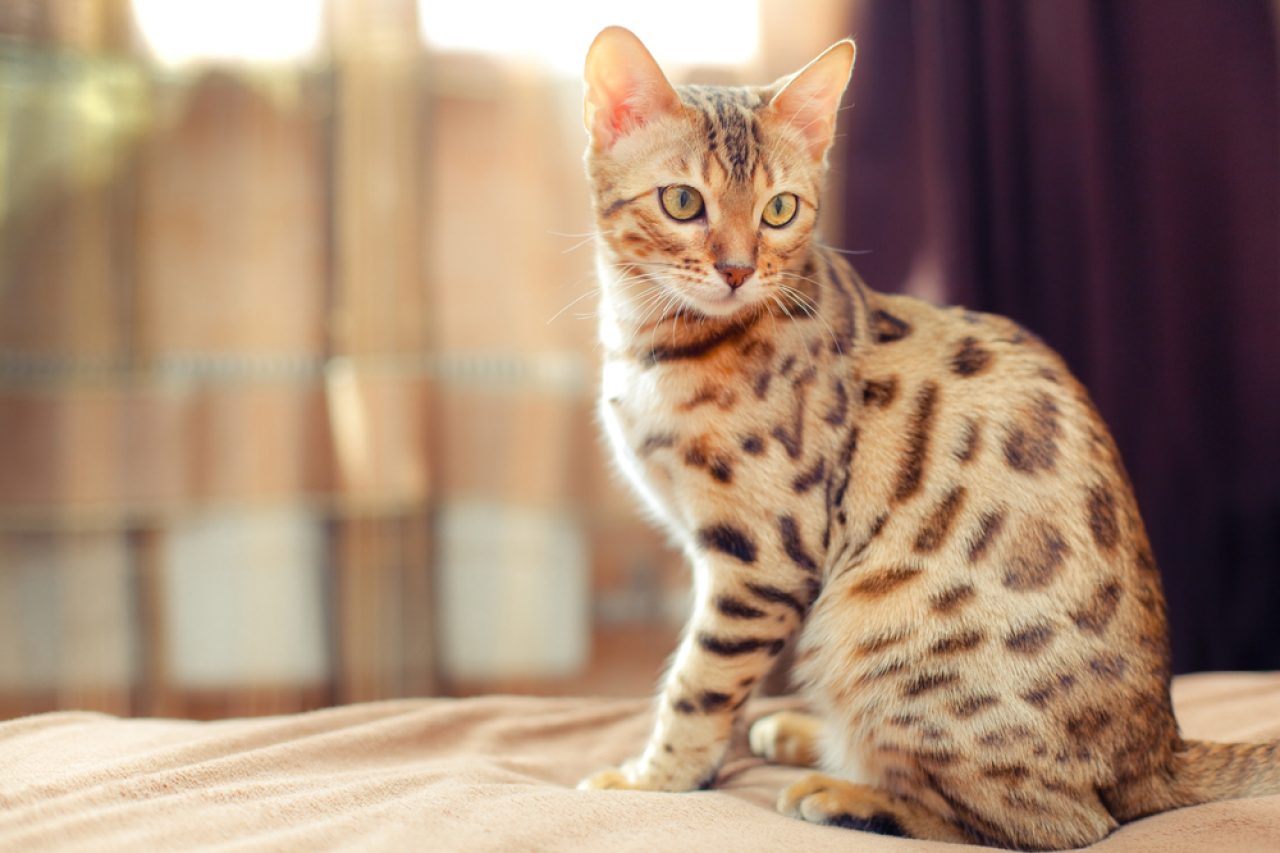
But, Bengal cats are not aggressive. Of course, they can become aggressive depending on the environment in which they grow up. As well as the prowess a pet parent possesses to properly care for such a high-maintenance breed.
Here’s the reality. Bengal cats wouldn’t be as popular as they are have they gone around the world attacking humans, animals, and anything that dares look at them. What made them sought-after seems to be the fact that they look like leopards but behave like kittens. A match made in heaven, if you ask me.
Bengals cats are soft and sweet. These beautiful beasts love being at the center of attention and entertaining everyone around them.
They enjoy hanging out with humans which makes them perfect for families with lots of members. And yes, they’re great with little humans as much as they’re great with big ones.
And, we can’t forget about the fact that Bengals are one of the most intelligent breeds out there. They’re “dogs of the feline world.” They can walk on a leash, play fetch, and learn how to do a bunch of other tricks. As it happens, the trick does seem to be in the way you train them.
Therefore, Bengal cats are not more or less aggressive than other breeds. Of course, they become aggressive when pet parents don’t take proper care of them, don’t teach them how to react and behave, and don’t choose the right environment for them. Here’s what we’ve gathered.
1. Aggressive when they’re afraid
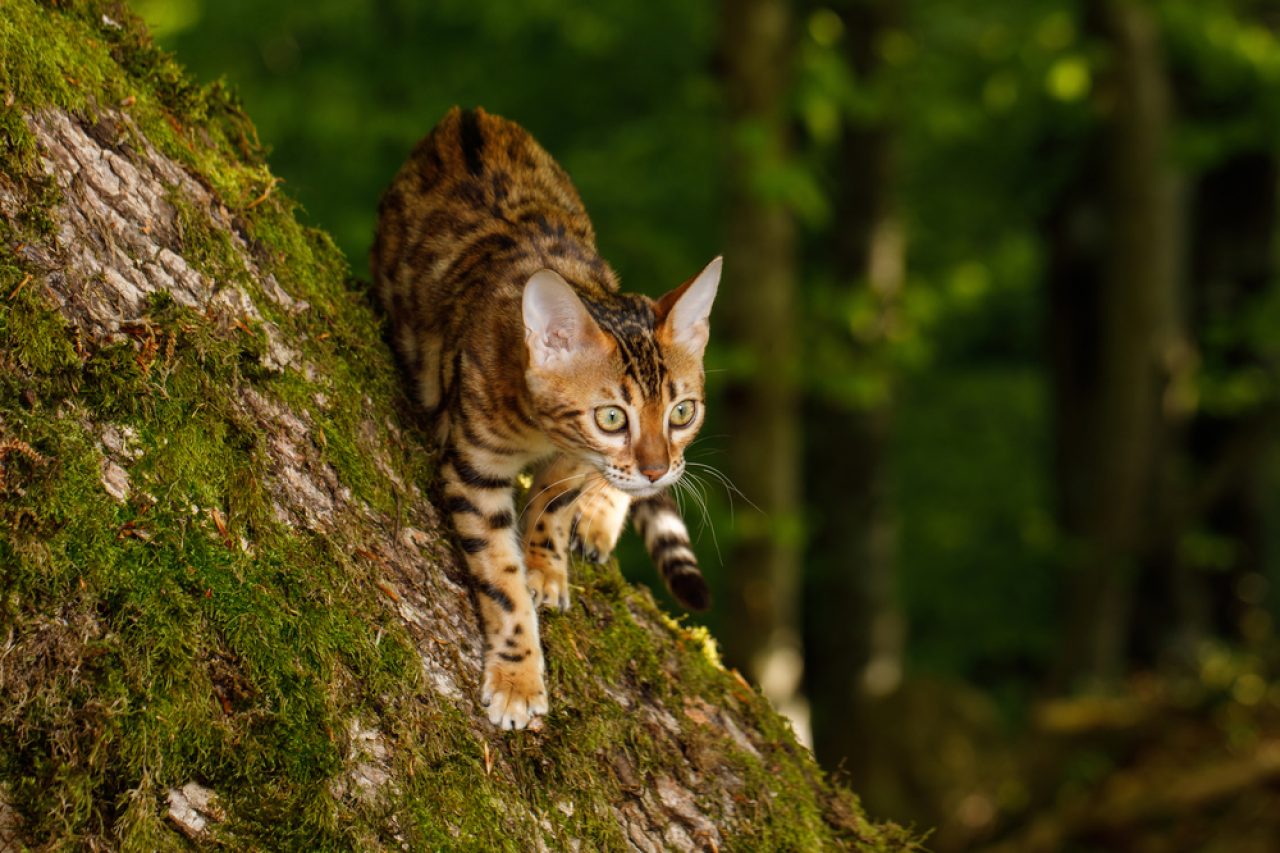
Now, cats (regardless of the breed) have that fight-or-flight response ready to go whenever they notice a sense of danger. Some cats are more prone to fighting when they feel threatened. However, that doesn’t necessarily stem from which breed they belong to – but rather what temperament they possess.
Bengal cats aren’t aggressive, but they might attack you when they feel as though you’re putting than in harm’s way. Whether that’s because you’re annoying them with your behavior or because you’re touching them without consent, they might resort to scratching or biting you to protect themselves.
2. Aggressive when they’re protecting their territory
“Are Bengal cats aggressive simply because they’re trying to protect their territory? Could that be the reason?”
Cats are very, very territorial (that seems to be a part of their nature). Some pet parents might argue that Bengal cats are more territorial than other breeds. But, we don’t have the evidence to support them which means we don’t feel comfortable throwing such “gossip” around.
Nonetheless, that’s not to say that most cats don’t become aggressive when they’re protecting their territory. Cats have many ways of marking what they consider their own – urinating on your furniture, pawing at the floor, and rubbing their teeth on you to claim you as one of their own.
And, when they catch a glimpse of another cat trying to take your affection, they might get ready to attack to show dominance. Nobody’s messing with you when you have a Bengal on your sleeve!
3. Aggressive when they’re protecting their kittens
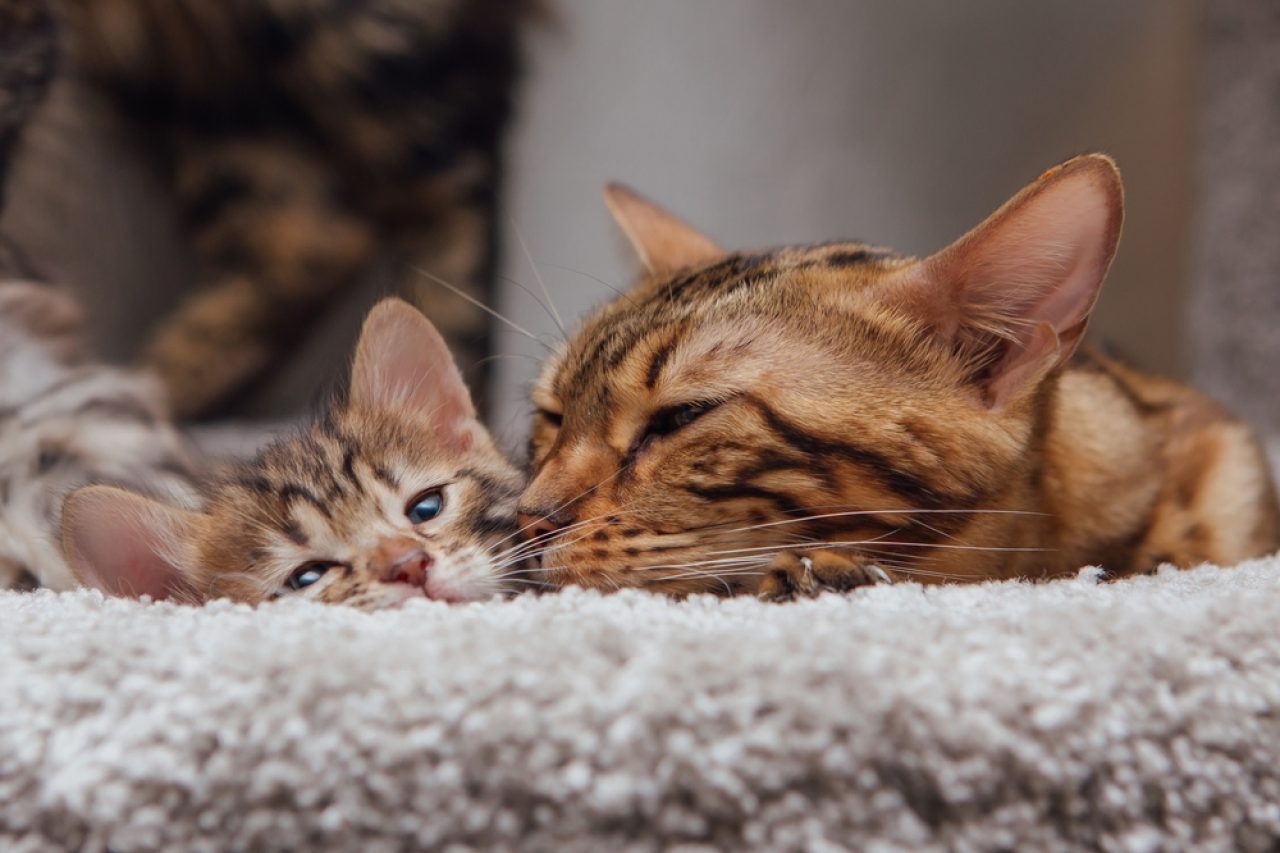
Oh, those maternal instincts are super strong when we’re talking about a cat protecting her kittens! Bengal cats don’t shy away from biting the hand of anyone who dares touch her kittens without asking for consent.
Cats don’t appreciate when humans cross the line with their offspring. They expect you to wait for them to be comfortable enough to show you their kittens on their own. And, while we’re on the topic, don’t let your friends or family come close to Bengal kittens unless you want them to lose a finger or two.
Bengal cats aren’t aggressive. But, they become aggressive when they think they need to protect themselves, their territory, or their offspring. That’s something you should keep in mind when planning on getting a Bengal cat or when you’re trying to figure out how to discipline your Bengal cat.
Are Bengal cats aggressive around other animals?
Bengal cats are not aggressive around other animals! Or, they’re at least not more aggressive than other breeds. As we already mentioned, a cat’s behavior doesn’t necessarily depend on the breed. Her behavior depends on the environment, the circumstances, and a bunch of other factors.
Granted that your Bengal cat does become hostile around other animals, she might need to re-learn certain patterns of behavior.
More times than not, cats become belligerent when they’re protecting something that belongs to them. And, that might even be a response to trauma they went through when they were younger.
But, Bengal cats are predators and you shouldn’t trust them around smaller animals. Rabbits, guinea pigs, hamsters, gerbils, birds, and fish should be off-limits to your little leopard. Other than that, feel free to schedule playdates with other cats (or even dogs).
Reasons why a Bengal cat might attack you (other than aggression)
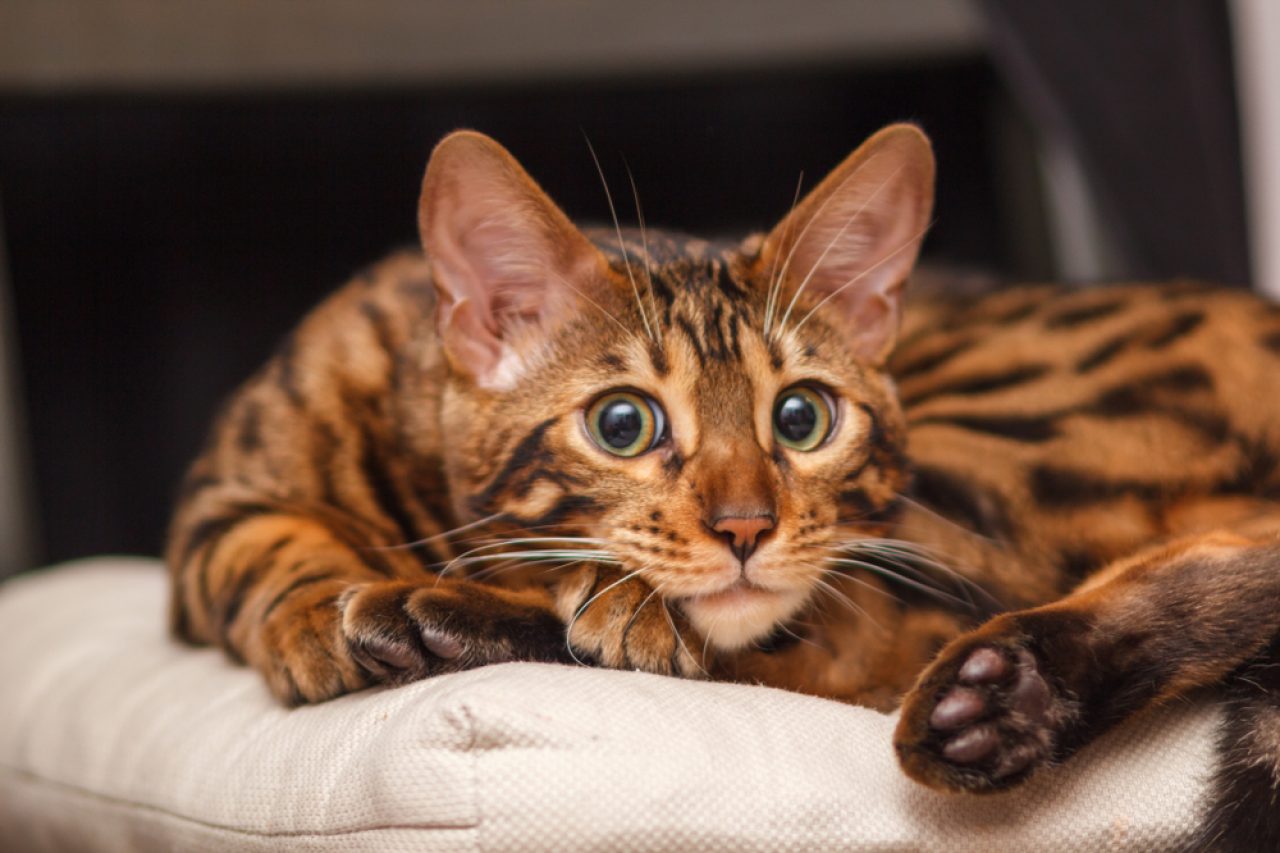
1. She doesn’t know better
When you’re wondering whether Bengal cats are aggressive, your mind doesn’t necessarily go straight to blaming someone else for how they’ve treated you.
But, that might not be the right approach considering the fact that Bengal cats have exceptional memory and learn faster than other breeds. This means they might learn to do something wrong, too.
For example, when your Bengal cat gets annoyed and aggressive, your response might be to cuddle her and give her treats to make her feel better.
However, she might take that as a green light to continue behaving that way. She learns she’s going to get a treat when she does that. Change the way you teach her and she might not have to bite your fingers off to get what she wants.
2. She’s bored
Bengal cats need a lot of mental stimulation, physical activity, and affection! When we say that Bengal cats are high-maintenance, that’s exactly what we’re talking about.
We can’t stress enough how much these leopard lookalikes hate boredom – they can’t spend a moment not knowing what to do with themselves.
And, though that might sound strange, they can become aggressive when they feel like they’re not getting what they need. Come on, how many times have you been angry with the world because you didn’t have anywhere to go on a Friday night?!
Therefore, Bengal cats need entertainment, toys, and scratching posts galore to stop themselves from trashing your apartment.
3. She’s stressed out
Bengal cats might not be aggressive because they’re “kind of wild.“ But they can be aggressive because they’re stressed out, overwhelmed, and overstimulated.
Whether you’re having a party at your place or you’re babysitting a bunch of your neighbor’s cats, your Bengal might not be enjoying herself as much as you thought.
When you notice she’s not feeling her best around other people or other animals, you might want to move her to a different room. When she starts behaving aggressively toward everyone, don’t wait for her to lose her mind completely before you do something.
Create a distraction for her, provide her with a calming environment, and don’t touch her under any circumstances. She might need an hour or two before she feels better.
4. She’s experiencing health problems
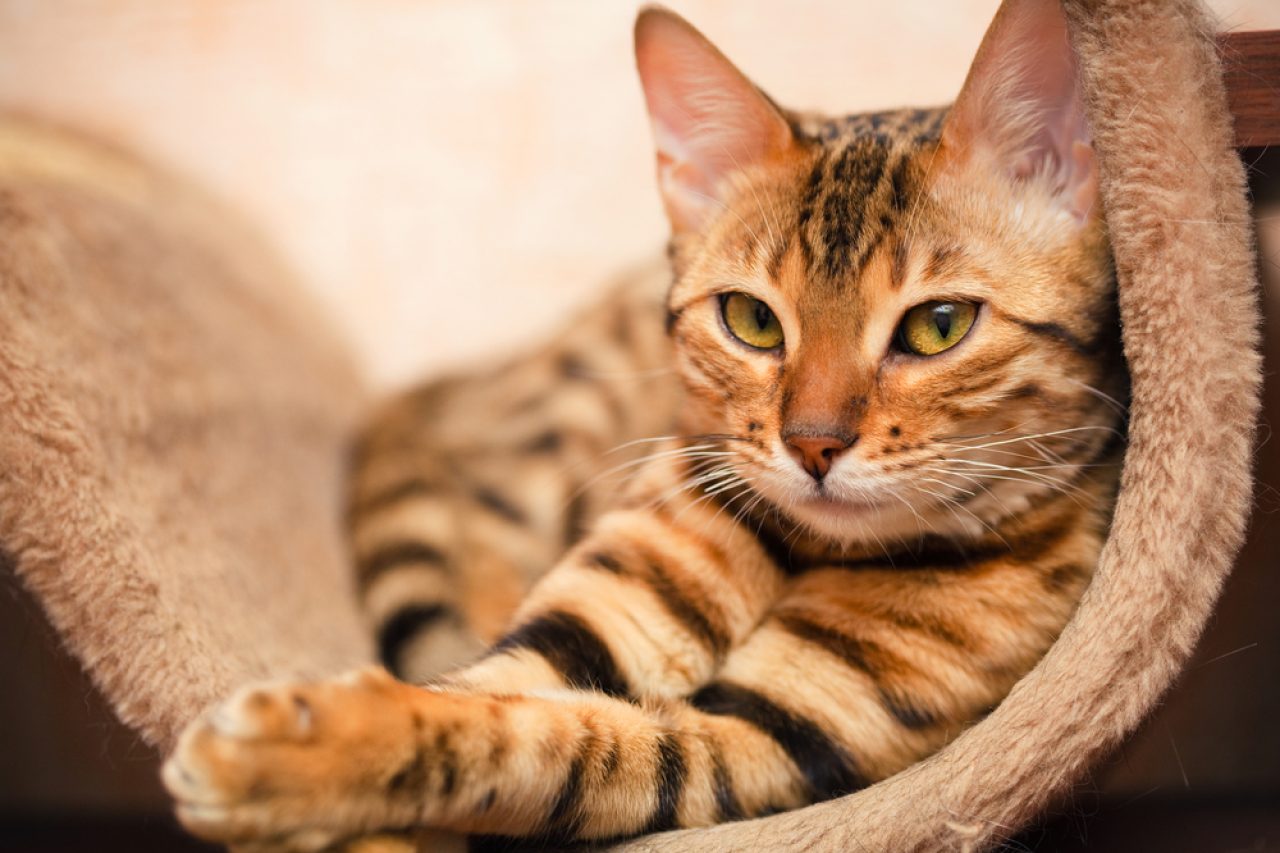
That’s right, cats can become aggressive when they’re dealing with health problems, discomfort, and pain. Surprisingly, many would argue that these three factors are the number one reason for aggression when we’re talking about Bengal cats, too.
So, some of the most common health problems a Bengal cat might deal with seem to be neurological diseases, degenerative joint disease, hyperthyroidism, arthritis, and dental disease. Make sure to keep an eye out for symptoms of these diseases and contact your vet the moment you notice something’s wrong.
Other than that, make sure you’re providing your cat with proper nutrition, physical activity, and an environment that stimulates her enough to have everything she needs for a happy and healthy life. A healthy Bengal cat shouldn’t become an aggressive Bengal cat, as they say (or something of the sort).
5. She’s dealing with past trauma
Now, there are occurrences when you don’t know what your cat’s history looks like.
Sure, you did your research and you found out that Bengal cats came to be as a cross between an Asian leopard and a domesticated cat. You learned that the Cat Fanciers’ Association didn’t recognize Bengal cats for a long time.
But, none of that can help you (that much) when you’re wondering whether Bengal cats are aggressive. Actually, the only history that can help you seems to be anything that happened while your cat was growing up.
Whether she was on the streets. Whether she lived in an abusive household. And, whether she experienced certain events that might have shaped the way she responds today.
Therefore, on the off chance that you didn’t get your Bengal cat while she was a kitten, you might want to consult with an animal behaviorist. A professional should be able to help you understand and deal with your cat’s aggression in the best way possible.
